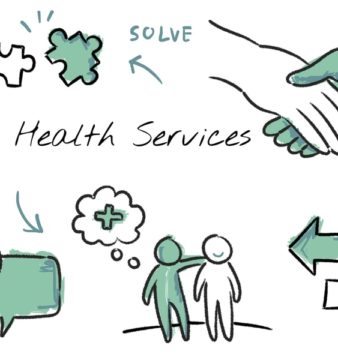Mental Health in the Time of COVID-19

COVID-19 has affected more than 200 countries and territories with more than 1.2 million confirmed cases, and at least 70,500 confirmed deaths.
Cities are on lockdown, travel is banned, and people are asked to stay at home and self-isolate in order to control the spread of the disease.
As people have been forced to stay home, concerns over mental health, and mental and domestic abuse have risen.
Mental health and well-being is a serious matter. It’s associated with living a healthy, happy and balanced life. It impacts how we feel, think and behave each day. There are many types of mental illnesses and/or disorders, including anxiety, depression, obsessive-compulsive disorder (OCD) and post-traumatic stress disorder (PTSD).
To date, the main psychological impact of the ‘stay at home’ order is elevated rates of stress or anxiety. But as new measures and impacts are introduced, levels of loneliness, depression, and self-harm or suicidal behaviour are also expected to rise.
Due to these concerns, World Health Organization (WHO) provides advice on how to stay mentally healthy during the COVID-19 pandemic. It gives advice to different segments, including healthcare providers, people who take care of elderly and children, and people who are in quarantine and self-isolation.
Here are some tips and advice to keep you mentally healthy and functioning during your stay at home:
1. Stay connected:
Thanks to modern technology, we don’t have to meet people face-to-face in order to stay connected with them. You can always call a friend or FaceTime with your family if you’re away from them. Use Zoom or Skip to hold meetings online. Staying home doesn’t mean you have to stop social and professional connections and networking. Your social life can still be vibrant.
2. Build a routine:
Having a routine is always helpful to reach your maximum productivity level and stay focused, but it’s crucial today, especially if you’re remote working so you can manage your time well, and to have a certain arrangement that you follow so you don’t feel overwhelmed or lost during the day.
3. Meditation and yoga:
Practicing meditation and yoga, which are disciplines that can help you relax your body and release stress. It’s substantial to mindfulness, better sleep, weight loss, and overall health.
4. Have some sunlight:
Self-isolating doesn’t mean you can’t see the sun. Studies have proved that not having enough Vitamin D may cause depression. So make sure to sunbath every morning for five minutes only.
5. Stay away from the source of distress:
Always take information from reliable sources such as the WHO website and the website of Sudan’s Federal Ministry of Health. Stay away from unreliable negative information and talk. Try to be positive and look at the crisis as a cloud that will eventually pass. Spread awareness, and be a reliable source of information in the time of rumours.
6. Occupy yourself:
Don’t give negative thoughts a room, always keep yourself occupied by taking online courses, watching TV/Netflix, read books and learn new skills. There are tons of activities you can practice from the comfort of your house. And Google search anything if you don’t know where to start.
7. Practice mindfulness:
Mindfulness simply means being here, in the now and the ongoing moment. Don’t overthink about the future and try to predict or create scenarios for what will happen and how all this is going to end. Always focus on the truth and facts you have in your hands in the current moment.
8. Don’t be shy to seek help:
Don’t be shy of seeking help from specialist or attention of your loved ones. If you’re having a moment, or your thoughts are going in light speed, call a friend or talk to a trusted family member, express your concerns, and talk about your fears.
9. Take time off:
A lot is going on right now and with the pressure that comes from social media specially about remote working and being productive is indeed overwhelming. It’s okay to take time off from social media as well as work. Put your phone on silent, pamper yourself with a long bath, a delicious meal and just stay in bed all day long and watch a season of your favourite series.
10. Exercise:
There are a lot of exercises you can practice at home. If you don’t normally exercise, consider adding some simple exercises to your routine like rope skipping, simple cardio or even dancing. It will help your overall health, keep you focused and energised, reduce stress and anxiety, and give you a better night sleep.
And of course, stay home and away from gatherings. Follow the instructions of the Federal Ministry of Health and WHO.

Born and raised in Omdurman, Thuraya Salih is a senior student at Sudan University of Science and Technology (SUST) and an amateur writer who is passionate about all forms of art.




